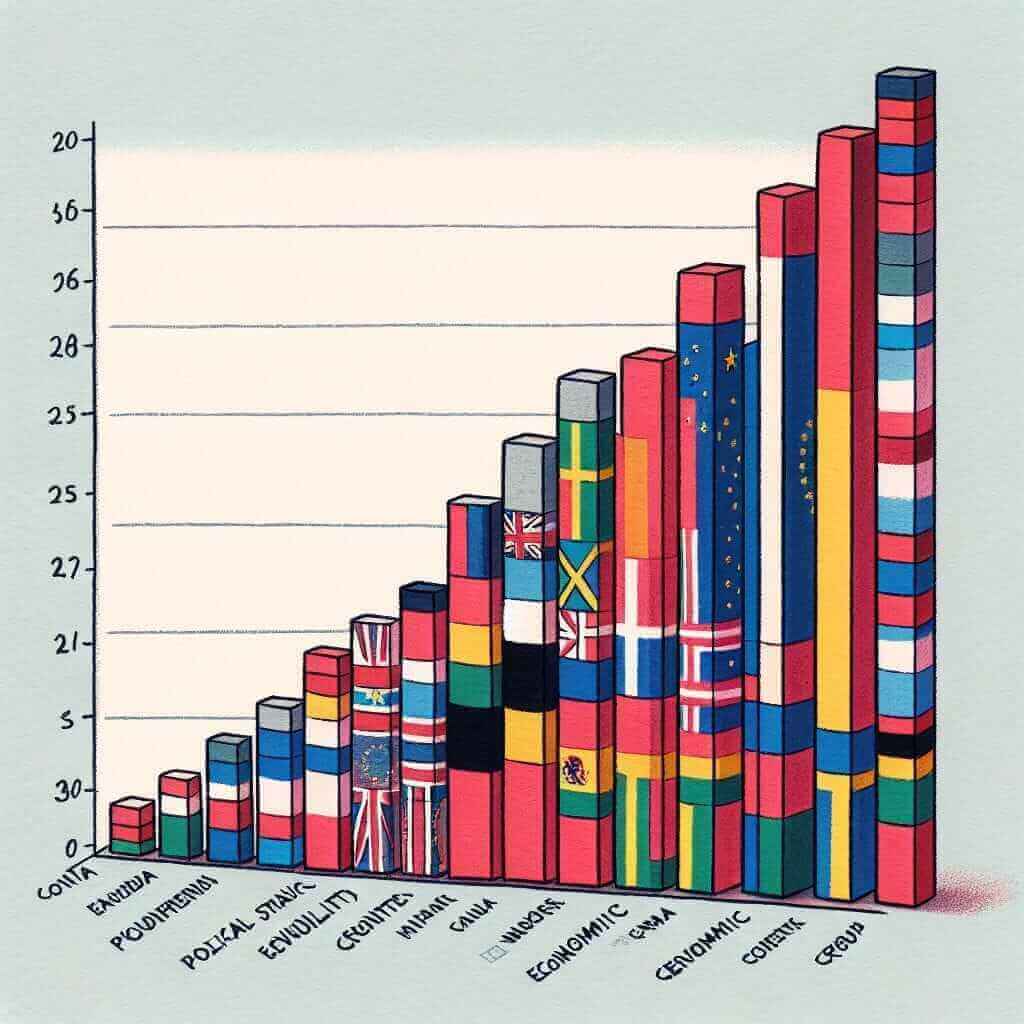Political stability is a crucial factor that significantly influences a country’s economic growth. The often-discussed topic has appeared in various forms in IELTS Writing Task 2 exams. Candidates may encounter questions that require them to discuss the relationship between political stability and economic growth, its effects, and potential solutions if instability is prevalent. This essay will delve into the reasons why political stability is vital for economic growth, using a sample IELTS Writing Task 2 question for practice.
Sample IELTS Writing Task 2 Questions
- “To what extent does political stability affect economic growth in developing countries?”
- “Discuss the impacts of political stability on economic development. Do you agree or disagree that political stability is necessary for a nation’s economic prosperity?”
- “Some people believe that political stability is the key to economic stability and growth. To what extent do you agree or disagree?”
Choosing a Sample Question
Let’s select the second sample question for our written model:
“Discuss the impacts of political stability on economic development. Do you agree or disagree that political stability is necessary for a nation’s economic prosperity?”
Analyzing the Question
This question asks candidates to discuss how political stability influences economic development, followed by expressing agreement or disagreement with the statement that political stability is essential for economic prosperity. Therefore, the response must comprise two main parts: an in-depth discussion of the impacts and a clear stance on the necessity of political stability.
Sample Essay
Political stability is often hailed as a cornerstone for economic development. It provides a conducive environment for businesses to thrive, encourages investment, and fosters economic policies that can lead to sustained growth. This essay will discuss how political stability impacts economic development and argue that it is indeed necessary for a nation’s economic prosperity.
One significant impact of political stability is that it creates a predictable environment for investments. Investors, both domestic and foreign, are more likely to invest in a country where the political landscape is stable. In an unstable political climate, the risks associated with investments increase, leading to capital flight and reduced foreign direct investment (FDI). For instance, countries in the European Union, known for their stable political environments, often see higher levels of FDI compared to politically volatile regions in Africa.
Moreover, political stability allows for consistent economic policies. When governments are stable, they can implement and sustain long-term economic strategies that promote growth. These policies might include infrastructure development, education improvement, and healthcare expansion, all essential elements for economic progress. On the other hand, frequent government changes and political unrest can lead to abrupt policy shifts, disrupting economic activities and deterring growth.

Additionally, stable political environments foster social cohesion and institutional trust, which are critical for economic development. When the populace trusts their government and its institutions, tax compliance tends to be higher, and public resources are utilized more effectively. Furthermore, social harmony reduces the likelihood of conflicts that can cripple economies, as seen in war-torn nations where economic activities are often at a standstill.
Given these impacts, I firmly agree that political stability is necessary for a nation’s economic prosperity. Without a stable political environment, economies struggle to grow due to constant uncertainties and risks that deter investment and disrupt economic planning. Therefore, governments should prioritize political stability to establish a solid foundation for economic development.
In conclusion, political stability significantly impacts economic development by creating a favorable investment climate, ensuring the continuity of economic policies, and promoting social cohesion. Hence, it is crucial for a nation’s economic prosperity. That said, while other factors like natural resources and human capital are also important, the absence of political stability can undermine these advantages, making it a foundational element for economic growth.
(Word Count: 373)
Important Notes on Writing
- Task Achievement: Ensure you fully address all parts of the question—discuss impacts and express your stance clearly.
- Coherence and Cohesion: Use linking words (e.g., “Moreover,” “Additionally”) to enhance the flow of your essay.
- Lexical Resource: Employ a wide range of vocabulary relevant to the topic (e.g., “predictable environment,” “capital flight”).
- Grammatical Range and Accuracy: Use complex structures and ensure grammatical accuracy.
Difficult Vocabulary
- Conducive (adj) /kənˈdjuː.sɪv/ – making a certain situation or outcome likely or possible.
- Capital flight (n) /ˈkæp.ɪ.təl flaɪt/ – the large-scale exit of financial assets from a country due to events such as political instability.
- Foreign direct investment (FDI) (n) /ˈfɔːr.ən daɪˈrekt ɪnˈvɛstmənt/ – investment made by a company or individual based in one country into business interests located in another country.
- Abrupt (adj) /əˈbrʌpt/ – sudden and unexpected.
- Institutional trust (n) /ˌɪnstɪˈtjuːʃənəl trʌst/ – confidence in the institutions that govern society.
Conclusion
In summary, political stability plays a vital role in economic development by fostering a favorable environment for investment, ensuring the continuity of economic policies, and promoting social cohesion. Learners should practice writing on this topic to prepare for similar questions in the IELTS exam. Students can consider additional prompts such as “How does political instability affect economic development?” to broaden their preparation.